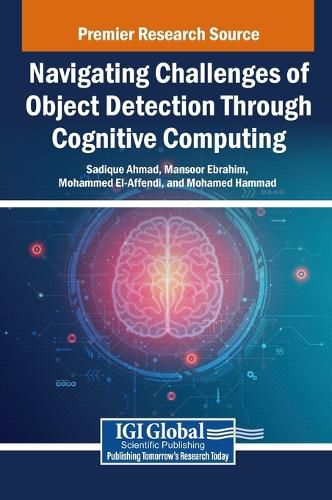Readings Newsletter
Become a Readings Member to make your shopping experience even easier.
Sign in or sign up for free!
You’re not far away from qualifying for FREE standard shipping within Australia
You’ve qualified for FREE standard shipping within Australia
The cart is loading…






This title is printed to order. This book may have been self-published. If so, we cannot guarantee the quality of the content. In the main most books will have gone through the editing process however some may not. We therefore suggest that you be aware of this before ordering this book. If in doubt check either the author or publisher’s details as we are unable to accept any returns unless they are faulty. Please contact us if you have any questions.
Cognitive computing is transforming how machines perceive, analyze, and make intelligent decisions, enabling breakthroughs in object detection, segmentation, and image processing. By integrating cognitive algorithms with machine learning, this technology enhances automation, accuracy, and efficiency across industries such as healthcare, finance, and agriculture. The ability of machines to mimic human reasoning opens new frontiers for innovation, leading to smarter diagnostics, risk assessments, and precision-driven solutions. As cognitive computing evolves, its applications will continue to reshape industries, improve decision-making, and drive technological advancements that impact society on a global scale. Navigating Challenges of Object Detection Through Cognitive Computing explores the challenges of object detection across various domains and presents cognitive computing-based intelligent techniques to overcome them. It provides insights into innovative methodologies for improving detection accuracy in complex scenarios such as surface defect detection, indoor environments, adverse weather conditions, UAV imagery, and camouflaged object detection. Covering topics such as smart engineering, social medial sentiment analyses, and healthcare, this book is an excellent resource for computer engineers, computer scientists, industry practitioners, professionals, researchers, scholars, academicians, and more.
$9.00 standard shipping within Australia
FREE standard shipping within Australia for orders over $100.00
Express & International shipping calculated at checkout
This title is printed to order. This book may have been self-published. If so, we cannot guarantee the quality of the content. In the main most books will have gone through the editing process however some may not. We therefore suggest that you be aware of this before ordering this book. If in doubt check either the author or publisher’s details as we are unable to accept any returns unless they are faulty. Please contact us if you have any questions.
Cognitive computing is transforming how machines perceive, analyze, and make intelligent decisions, enabling breakthroughs in object detection, segmentation, and image processing. By integrating cognitive algorithms with machine learning, this technology enhances automation, accuracy, and efficiency across industries such as healthcare, finance, and agriculture. The ability of machines to mimic human reasoning opens new frontiers for innovation, leading to smarter diagnostics, risk assessments, and precision-driven solutions. As cognitive computing evolves, its applications will continue to reshape industries, improve decision-making, and drive technological advancements that impact society on a global scale. Navigating Challenges of Object Detection Through Cognitive Computing explores the challenges of object detection across various domains and presents cognitive computing-based intelligent techniques to overcome them. It provides insights into innovative methodologies for improving detection accuracy in complex scenarios such as surface defect detection, indoor environments, adverse weather conditions, UAV imagery, and camouflaged object detection. Covering topics such as smart engineering, social medial sentiment analyses, and healthcare, this book is an excellent resource for computer engineers, computer scientists, industry practitioners, professionals, researchers, scholars, academicians, and more.